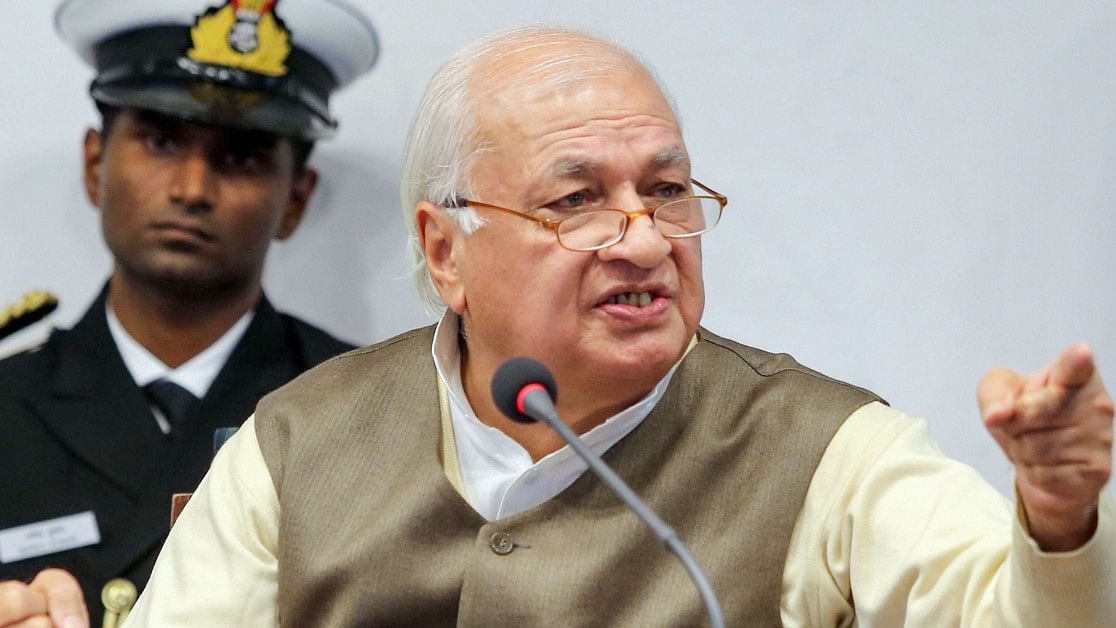
Kerala Guv Arif Mohammed Khan.
Credit: PTI Photo
Kochi: In a blow to Governor Arif Mohammed Khan, the High Court here on Tuesday quashed the nominations made by him as Chancellor of Universities to the senate of the University of Kerala and directed him to select fresh nominees within a period of six weeks.
The court, however, did not interfere with the nominations of the state government to the senate of the same university.
While quashing the nominations made by Khan, the court observed that "there is no unbridled power vested with the Chancellor while making the nominations in terms of the statutory provisions".
Justice Mohammed Nias C P said that if a nomination made is contrary to the statutory requirement or if irrelevant factors were considered in making the decision, "the nominations will have to be interfered with by the constitutional courts".
The court said that any arbitrary use of power violates not only the rule of equality enshrined in Article 14 of the Constitution of India but also the rule of discrimination inbuilt in Article 16.
"An unguided, unfettered and unbridled power is foreign to the exercise of any power, constitutional or statutory. It is trite that even in the exercise of discretionary power, the requirements of reasonableness, rationality, impartiality, fairness and equity are inherent to such exercise and can never be according to any private opinion.
"Under such circumstances, the nominations made (by the Chancellor) are to be interfered with and accordingly, they are quashed," the court said.
The order came on the two separate pleas by four students of the university challenging the nominations to the senate made by Khan in the categories of Fine Arts, Sports, Humanities and Science.
The petitioners had alleged that the normal procedures were not followed by the Chancellor and persons with no merit, as compared to them, were nominated to the senate.
They also sought directions to the Chancellor to nominate them to the senate.
The court directed Khan to "make fresh nominations considering the claims of the writ petitioners as well" and in tune with the provisions of the Kerala University Act, 1974.
"This shall be done within a period of six weeks from the date of receipt of a copy of this judgment," it said allowing the two petitions challenging the Chancellor's nominations.
The court, in its order, observed that even though no procedure as such was stated in the statute, it compels the persons nominated to be of outstanding academic ability when it comes to Humanities and outstanding ability when it comes to the other three categories.
"The term outstanding ability certainly denotes a superior ability or performance. No credentials of the respondents (nominated students) are shown which makes them superior to the writ petitioners. No single factor of the nominated students is shown superior to the abilities of the writ petitioners.
"True, it is only a nomination and there is an element of discretion involved while making choices. Even for that, eligibility criteria fixed in the statute cannot be forgotten even though it is only a nomination and not a selection," the court said.
In the third petition challenging the nominations to the senate by the state government, the petitioner had claimed that the nominees did not have any experience in the field of higher education and that they had several crimes registered against them, thus making them ineligible to hold the post of government representatives.
Dismissing the petition, the court said that on examining the credentials of the government representatives, "it is difficult to hold that they are not from the field of higher education".
It also said that the criminal cases against the nominees were registered "as part of their activities in public life".
"That apart, they are all cases pending investigation and no court of law has found respondents 4 to 6 (government representatives) guilty of the offences alleged and therefore, mere pendency of cases cannot be treated as a disqualification making respondents 4 to 6 ineligible for nomination.
"Given my findings that they cannot be said to be persons not connected with the field of higher education, I do not find any merit to interfere with the nomination and accordingly the said writ petition is dismissed," the court said.
The High Court's decision was welcomed by the ruling Left government in Kerala and the CPI(M).
State Law Minister P Rajeev said that the Chancellor of Universities cannot be seen as a "sovereign republic".
CPI(M) state secretary M V Govindan termed the court decision as a setback for the "political games" of the Governor.
He said that despite the state government submitting a panel of students who excelled in their respective fields, Khan, in alleged violation of the norms, nominated Sangh Parivar members to the senate for political reasons.
Govindan contended the court's order makes it clear that the government's approach in the field of higher education is correct and that of the Governor was wrong.
The CPI(M) state secretary said that the order also exposed the Sangh Parivar's alleged interventions using the Governor to create a crisis in the state and it was also a blow to the UDF and BJP leadership that supported Khan's actions and stood against the government.
He said the verdict would also affect the alleged wrongful nominations made by Khan in other universities.